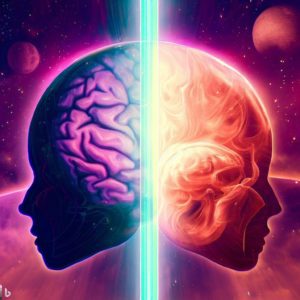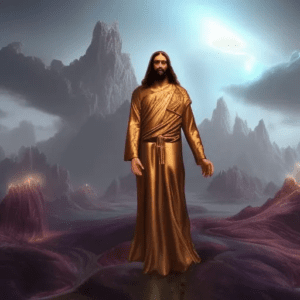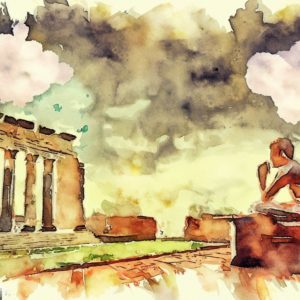Introduction:
In this thought-provoking exploration, we embark on a journey beyond the traditional perception of Jesus as an historical figure and the Son of God. We delve into the personal interpretation of Jesus, inviting readers to consider his representation as a symbol of our true selves. By examining the concept of the Logos of God and the dichotomy between the false self and the true self, we unlock profound insights into our own spiritual identities.
Jesus as the Embodiment of the True Self:
We delve into the notion that Jesus, beyond his historical and divine significance, symbolizes the authentic essence within everyone. If Jesus is the Logos of God, the Mind of God, and as such is the True Self of God, then by analogy of being made in the Image of God, or the analogy of the microcosm and the macrocosm, finding our own inner selves, our True Self, is to find Jesus within as well.
But how does this process begin? How do we take the first steps towards locating what is and is not the real me within the thoughts of our mind?
This begins by acknowledging the presence of thoughts and tendencies that feel alien or imposed upon us. This is a method by which we open ourselves to the possibility of a true self that transcends societal conditioning. This is difficult because of the natural predisposition humans have towards physical preservation. The problem is this tendency transfers to our internal mental or egoic or imagined self as well.
“The thoughts within our mind are our thoughts alone and thus, must be our self.”
This might be something we think within the confines of our own mind that keeps us locked in a state of victimhood, or depression, or anger or any of the overwhelming states of mind and feelings that we cling to because they create for us a sense of identity even if they are harmful to us.
There is a deep and transformative power in recognizing that many of these thoughts and feelings or patterns of thinking and feeling are acquired from our parents or our culture and as such, were not chosen consciously by us as our preferred method of thinking or feeling—or that we have a choice in how we think and feel. As such, they do not constitute the true or eternal self but are transitory. Change the pattern of thought or feelings and the thoughts and feelings change as well. Since they are changeable, they must not constitute anything real, or the ideas most attribute to an authentic or true or eternal self. Embracing this search within for a true or authentic self is what the ancients called Knowledge of the Self.
Exploring the Law of Correspondence and Duality:
Drawing on the principle of correspondence, we unravel the interconnected nature of duality. By contemplating the existence of a false self, we are led to the understanding that its counterpart, the true self, must also exist. Meditating on paradoxes and dualities such as this have been known to bring profound insights into our journey of self-discovery of what it is to be human, alive, thinking, feeling, etc. Night, day, up, down, in, out, internal, external, hot, cold, etc. The contemplation of one brings the contemplation of the other, the opposite.
Mental Alchemy: Embracing the Law of Polarity:
This process of meditating on and understanding duality or paradox is mental alchemy. The term of course is derived from the science that existed before Chemistry known as Alchemy, or the turning of physical lead into physical gold. However, these teachings were the external mask covering the internal or esoteric mental alchemy of turning thoughts, mental frameworks, feelings, or beliefs that are harmful or unwanted into ones that are useful (spiritual gold) or at least no longer mentally or emotionally draining. This is also known as the Law of Polarity. The Bible quotes this as, “Let a weak man become strong.” By harnessing the transformative power of shifting from one pole to the other, we uncover deeper truths about ourselves and our spiritual nature and the workings and managing of the mind. Doing so, helps to unlock our authentic selves since we shed our old skin for new skins by performing these mental processes within, or when Jesus says, “You cannot put new wine into old wineskins, or they will burst. Wine must be put into new wineskins.”
Conclusion: Embracing the Journey of Self-Discovery:
As we conclude this exploration, we invite readers to embark on a personal journey of self-discovery, drawing inspiration from the symbolic significance of Jesus. By embracing the existence of a true self and recognizing the interplay of dualities within our lives, we open ourselves to profound transformation and spiritual growth.





